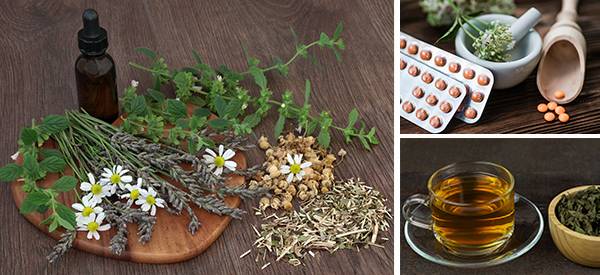
These Herbs Will Relieve Your Anxiety in No-Time
Are you feeling anxious? If so, you’re not alone by any means. Anxiety is one of the most prevalent mental health disorders in the United States, affecting 40 million adults over the age of 18.
Mental illness is often misunderstood and can carry a stigma that inhibits people from seeking treatment and support. It can be a debilitating condition that can manifest into more severe forms of mental illness and out-of-character behaviors.
Understanding Anxiety
Anxiety is the fastest growing mental illness in America, with 18% of Americans experiencing an anxiety disorder.
It’s a general feeling of worry and unease that can range from mild to severe.
Common symptoms are difficulty sleeping, headaches, muscle tension and pain, irritability, and poor concentration.
Anxiety disorders can significantly impact your life – from social interactions to your ability to function at work or school.
Keep reading on to find out more about these herbs to help relieve your anxiety.
The Best Herbs to Relieve Anxiety
Anxiety is often thought to be a primarily psychological disorder. Still, it can also be rooted in an imbalance of the body’s natural chemistry.
The spring herbs listed below can help relieve anxiety by targeting these imbalances and restoring normal balance to your system.
Chamomile
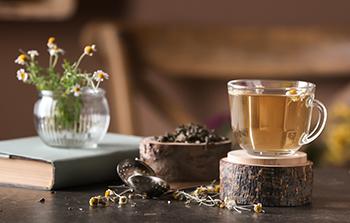 Chamomile (Matricaria recutita) is a late-spring flowering plant belonging to the daisy family.
Chamomile (Matricaria recutita) is a late-spring flowering plant belonging to the daisy family.
The name comes from Greek chamaimelon, meaning “earth apple,” and may refer to the plant’s scent.
Chamomile has been widely used as a natural herbal remedy since ancient times, with records of its use in Egyptian purification rites and traditional Chinese medicine (TCM).
It’s often used to help with anxiety and insomnia because the herb contains volatile oils that act as natural muscle relaxants.
It might also be beneficial for those with fragile stomachs or colitis exacerbated by anxiety disorders because it has an anti-inflammatory effect on the digestive tract.
Chamomile Tea
Quite simply the simplest tea to make to calm anxiety.
Take a chamomile tea bag or just the flowers and put them in your cup of hot, but not boiling water for around 5 to 10 minutes, then you can drink it.
Lemon Balm
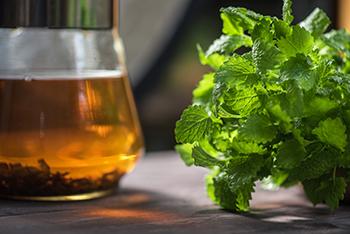 Lemon balm (Melissa officinalis) is a sweet-smelling herb that has been used for medicinal purposes throughout history.
Lemon balm (Melissa officinalis) is a sweet-smelling herb that has been used for medicinal purposes throughout history.
It can be taken in tea form, rubbed on the skin, or even inhaled.
The plant contains the terpenoids citronellal and citral, both calming and sedative. The leaves of this herb also contain flavonoids that act as anti-inflammatories.
Lemon balm is also an antioxidant with antibacterial properties.
Research suggests that taking lemon balm extract provides relief from stress-induced anxiety among people who find themselves in high-pressured environments.
Lemon Balm Tea
These are the ingredients:
- 1 tablespoon dry lemon balm leaves (or two tablespoons fresh leaves)
- 10 ounces boiling water.
- Honey or agave as optional sweeteners for your drink.
For a standard-sized teacup, fill a tea strainer or ball with lemon balm and allow to steep in hot water for 5-10 minutes before removing the tea strainer and adding the desired sweeteners if you choose so.
Lemon balm is an excellent medicinal herb for reducing anxiety and insomnia, especially when used in a concentrated tincture form, like the one found in the Apothecary.
Catnip
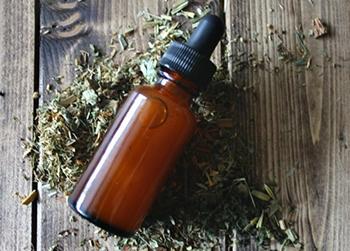 Catnip (Nepeta cataria) gives cats a feeling of euphoria, but in humans, it reduces tension and soothes frazzled nerves.
Catnip (Nepeta cataria) gives cats a feeling of euphoria, but in humans, it reduces tension and soothes frazzled nerves.
The leaves from the plant are often used as a sleep aid, though they primarily act to change one’s mood rather than sedate them.
Catnip grows as short-lived perennial plants in gardens; mature plants typically shed seeds that give rise to volunteer seedlings in subsequent years.
Established catnip can be grown during springtime by cutting back the plant halfway- this will quickly regrow and start blooming with large amounts of leaves ready for drying in late springtime.
Catnip Tincture
You can either use catnip as a herb for tea or a tincture.
A suggested dose for adults is 30-40 drops of the tincture 3x/day.
If you prefer to make an alcohol-free tincture version, that’s fine too!
Tulsi Basil
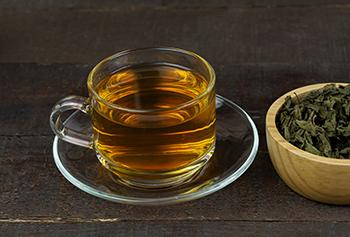 Tulsi basil (Ocimum tenuiflorum) is native to India and sacred to Hindus.
Tulsi basil (Ocimum tenuiflorum) is native to India and sacred to Hindus.
It’s also called holy basil, and it has a wide range of healing benefits in Ayurvedic medicine.
Tulsi basic offers relief from the impacts of stress on the body, which research studies have proven again and again; furthermore, its value for anxiety management as well as depression was confirmed by several scientific studies too.
A delightful herb with a citrusy bouquet that can be slightly musky when dried, tulsi perfumes any kitchen when added to boiling water or tea- what a fantastic addition!
Drying Tulsi Basil For Infusions
- Gather small bunches of the flower spikes together at their base with string or twine.
- Hang them up in a warm, dark, and dry place such as a garage or a dry store cupboard.
Lavender
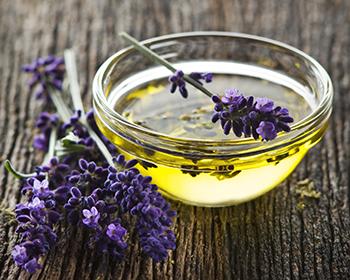 Lavender (Lavandula) is well known for its amazing ability to create a calm atmosphere.
Lavender (Lavandula) is well known for its amazing ability to create a calm atmosphere.
In fact, one of the main benefits of lavender is that it can take away your stress without making you too tired or setting you to sleep.
More than just generating a peaceful state in your mind, lavender can also reduce anxiety by influencing the fight or flight response.
Lavender, in an essential oil format, has been found to be effective in reducing anxiety through some studies conducted, as well as having a positive effect on things such as:
- Reducing restlessness
- Promoting sleep
- Relieving nervousness and agitation
- Alleviating depressive symptoms
Lavender Oil
- Lavender oil is created by steeping dry lavender flowers in a carrier oil for one week to several weeks.
- As the dry flowers infuse with the oils, natural essential oils from lavender are drawn out and into your chosen carrier oil.
- Popular choices for carriers include extra virgin olive oil, jojoba seed extract, or sweet almond extract, among many more.
Peppermint
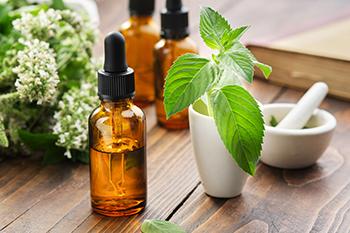 Peppermint is a plant from the Lamiaceae family.
Peppermint is a plant from the Lamiaceae family.
It’s often used in herbal teas to provide relief from gas and indigestion and calm mild stomach aches and bloating.
However, it also has anxiety-reducing effects that are similar to certain types of medication.
As a plant extract, peppermint oil is a natural remedy.
It’s been shown to reduce symptoms of stress and anxiety; the ester menthone in the oil makes it more effective than other plants.
In this way, when you inhale the scent of peppermint or ingest it as an extract, it can work to calm your central nervous system and help alleviate your anxiety-related symptoms.
Peppermint Tincture
- Fill a clean glass jar with fresh peppermint leaves and pour in 80-proof vodka or glycerin if you dont want to consume alcohol.
- Wrap the mouth of the jar with wax paper or plastic wrap and close tightly, then shake vigorously.
- Keep it in the dark for four to six weeks, shaking daily.
- Strain out plant matter after steeping time is up (your liquid will be green).
- Label your bottle clearly with the contents and date; this stuff can last years if stored properly!
- You can add 10% glycerin to make it more drinkable,
Valerian
 Valerian (Valeriana officinalis) has been generally considered safe at recommended doses, but since long-term safety trials are lacking, use it for only a short period (up to two weeks) unless your doctor approves otherwise.
Valerian (Valeriana officinalis) has been generally considered safe at recommended doses, but since long-term safety trials are lacking, use it for only a short period (up to two weeks) unless your doctor approves otherwise.
It may cause some adverse side effects such as headaches, dizziness, and drowsiness in some cases.
Valerian root can be taken by swallowing it as a capsule, drinking it in tea, or tablets.
Ideally, valerian should be taken half an hour to two hours before bedtime.
Valerian Leaf Tea
- Add one heaped tablespoon of your desired herb to boiling water in a teapot or infuser ball to make a delicious bedtime tea.
- Allow the herbs to steep in the hot water for five minutes before discarding the herbs.
- Sweeten it with honey or another vegan alternative and enjoy 30 minutes before bedtime!
You’re not alone if you have anxiety; it’s one of the most common mental health disorders.
Anxiety can be a debilitating condition, and some suffer from more severe forms that manifest into inexplicable behaviors.
You don’t have to live with anxiety alone!
While some prefer going down a pharmaceutical route for treatment, others head down an alternative path using natural remedies such as spring herbs which may help relieve your symptoms and prevent future episodes of unease when they strike again.
These herbs can be prepared in so many ways, from teas to tinctures or simply just adding a little to your meals, so whichever way you choose to take them, make sure they are the best for you and you do your research to be safe!
You may also like:
 Mugwort Pillow for Insomnia and Anxiety
Mugwort Pillow for Insomnia and Anxiety
Just like Xanax, the Anxiety Relieving Plant That Grows in Your Backyard (Video)
30 Anti-Anxiety Remedies You Didn’t Know About

I had the flu and I took Nicole’s elderberry tincture along with drinking cedar tea and my illness disappeared after only two days! Amazing!!
That’s fantastic! That’s what I use too – it works so well. So glad to hear!
Following the video steps on making pain killer from wild lettuce, (here: https://www.thelostways.com/vsl/index.php?hop=lostherbs&vendor=lostways
the guy says to store the resulting past in your cupboard. But, having tried this before, the past molded in no time flat so that can’t be right. Plus, I guess you have to buy, “The Lost Ways”, to learn how to use it as a pain killer as this cute guy doesn’t ‘go into that part. I hope to save up for this book. I I love learning all kinds of old/lost ways and information.
I usually store it in the fridge. It still may have mold a little on top, but it doesn’t hurt to just scrape it off.
wondrful information.thank you.
I have been combining the info I gain here with my mead brewing to come up with some old-world metheglin [medicinal honey wine (mead)]
I also share this info across my social media sites [MeWe, Gab & Gettr]
Back to the video on making pain killer from wild lettuce. I followed the steps using about 250 leaves but it never did become a past. It only kept reducing to the point of being about 1/3 of a small baby food jar of the brown liquid. I feel the video is deceptive. There is no way he could have gotten that much past from only 50 leaves. I wasted hours of natural gas trying to reduce it to a past. Can someone please explain this disappointment?
I had the same experience with the most beautiful 5′ tall wild lettuce plant. I simmered it for at least a couple of hours until the water was brown, then strained it and heated it for several more hours, even in the slow cooker on low overnight and ended up with a small jelly jar of liquid, not pasty at all. Other youtube videos talk about adding alcohol to it while cooking, but I don’t see why that would thicken it either.
Doc Jones is so much more practical! He’s at HomeGrownHerbalist.net. Anyway, he says just combine your alcohol and plant material in a blender. Make sure you have enough alcohol in the jar to cover all plant material. Keep in dark cupboard for 6-8 weeks. Strain.